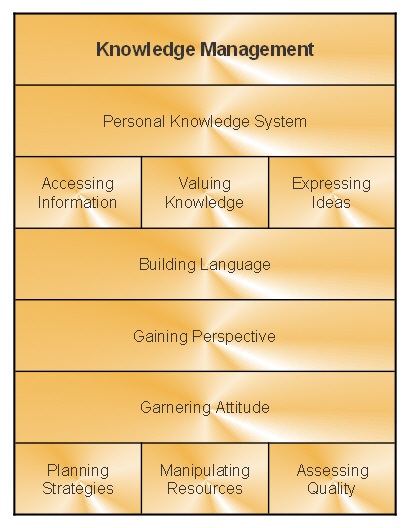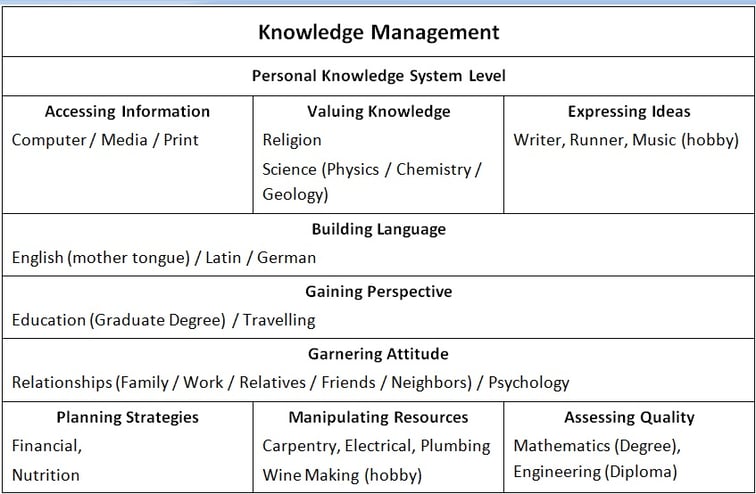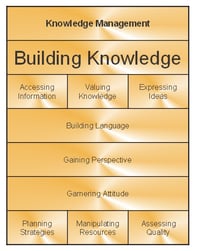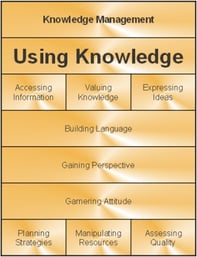Published on
Personalizing Knowledge Through Knowledge Management

Take charge of your learning; take charge of your life.
All of us have an idea of how smart we are. That idea has most likely come from our encounters with education. Others have passed judgment and our permanent records stand; and no matter how much or how little we accomplish beyond school, that record can considerably influence our own opinion of ourselves and other’s opinion of us because it is the only record we have.
Suppose we could reverse that and take charge of our own learning. We could become our own knowledge managers. We could start by describing our own personal knowledge systems and using them to illustrate our complete knowledge picture from formal education, life and work experience, and personal study and research.
In a previous article for The EvoLLLution, “Knowledge Management as a Model for Education”, I described the natural learning process. The elements of the natural learning process provide us with the parameters of knowledge management. We can use those parameters at each level of the learning process. I will start with the personalizing knowledge level because it will be the most meaningful and everyone can easily identify that that level.
For Example
I will use a fictitious example somewhat inspired by my own personal knowledge system. Of course, we must always realize that we have both described knowledge and tacit knowledge. It is impossible to write a true description of everything that a person knows because so much of what we know is implicit. However, by looking at our described knowledge as a system, we can get a pretty good general idea of our tacit knowledge as well.
At the personalizing knowledge level, we can provide a general view of the major areas of knowledge that have had the most influence on our lives. We can also realize from the system that all areas of knowledge are important in the overall scheme of things. It is not always the big areas of certified knowledge that has the most influence on our lives. Many times it is the knowledge that we have built by just living that has the most value to us. We can be proud of what we know even if it was not taught and evaluated by someone else. As such, this kind of knowledge is just as valuable as knowledge we have received through education and training.
By putting all our personal knowledge into a system, we are getting our heads around what we already know and making the first step in taking charge of our own learning.
Briefly, the personal knowledge system shows that the individual can get information from computers, media and print. He has religious affiliation as well as scientific knowledge that he uses to value any new knowledge that he develops. He expresses himself through writing, music and through running as a recreational activity. He has knowledge of more than one language. His primary perspectives in life come from his work as an educator and from travelling that he has done. His relationships have had influence on his attitude which is a considerable part of the total personal knowledge picture because it impacts on everything he does. He does his own financial planning. Nutrition is also an important strategy for wellbeing. He manipulates resources in carpentry work, electrical work and plumbing for personal needs and makes wine as a hobby. His has a degree in mathematics and a diploma in engineering which provides a background in quality analysis and measurement.
Looking at the knowledge of this individual as an interrelated system defined by the knowledge management parameters provides a much more comprehensive picture than an itemized resume. We can generalize that this person has a broad range of knowledge and skills, and things that may not seem important suddenly become a prominent piece of the picture.
My next article will describe how we can take items in a personal knowledge system and break them down into subsystems which show the extent of knowledge that has been developed in each item listed. By providing our own unique details of our learning, we can make it legitimate because no two peoples’ experiences are the same.
Author Perspective: Business




